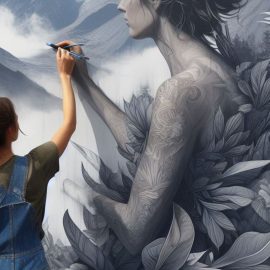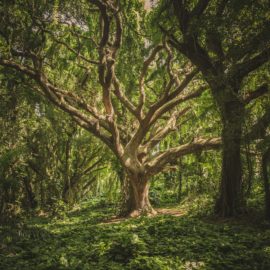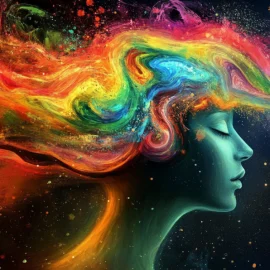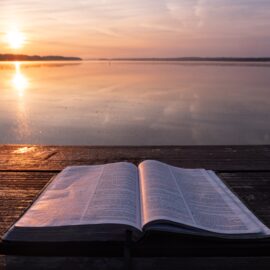
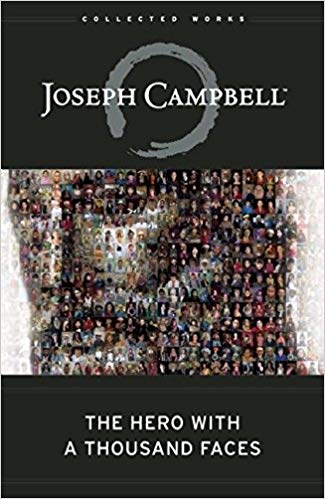
This article is an excerpt from the Shortform summary of "The Hero with a Thousand Faces" by Joseph Campbell. Shortform has the world's best summaries of books you should be reading.
Like this article? Sign up for a free trial here .
What is stage 17 of Joseph Campbell’s hero’s journey? What is the significance of the “freedom to live”?
Freedom to live is the stage of the hero’s journey in which the hero has found a balance between his internal and external worlds and he no longer fears death. Freedom to live is stage 17, the last stage, of Joseph Campbell’s hero’s journey, from The Hero with a Thousand Faces.
We’ll cover what the freedom to live entails and look at examples of the freedom-to-live stage of the hero’s journey.
Freedom to Live: Stage 17
Now, at last, the hero returns to the ordinary world with their divine boon in hand. The hero’s journey has been an exercise in uniting the world of the unknown with the world of the known—for the two are mirror images, opposite sides of the same coin. The challenge now is to communicate to the ordinary world the wisdom and enlightenment that the hero has learned in their quest to the land of the gods. This challenge is part of the freedom to live.
One of the hardest things for the hero to accept is the reality of the sorrows and banalities of ordinary human existence.
The true hero is one who can move seamlessly between the two worlds, without destroying or compromising either. We see this in the Transfiguration of Christ from the New Testament, in which the body of Jesus becomes radiant with the glory and grace of God. The freedom to live is not without its struggles.
The Final Crossing
The hero’s journey lives on in the rituals surrounding death, during which the living make preparations for the departed to journey safely through to the land of the dead. Like the hero, the deceased is journeying back to the primordial state of divine knowledge and union with the creator. This is also part of the freedom to live. For heroes, there is always life after death.
There is an early example of this idea of the freedom to live after death in the Coffin Texts of Ancient Egypt, in which the dead man proclaims himself to be joined to God, declaring, “I am Atum, I who was alone; I am Re at his first appearance. I am the Great God, self-generator, Who fashioned his names, lord of gods, Whom none approaches among the gods. I was yesterday, I know tomorrow.” The Egyptian Book of the Dead was entombed with the deceased to guide the soul through the perils it would face as it made its way to the afterlife, complete with spells to ward off evil spirits and special incantations to compel the god of the dead, Osiris, to open the gates.
Of course, the ability to make this journey successfully depends upon the quality and character of the life lived by the deceased. The soul’s journey is its own hero’s journey in microcosm, beset with dangers, hardships, and setbacks. These are time-honored elements of the world’s mythic traditions and are part of the freedom to live.
The Aztecs prepared the body for its transition and provided it with water and other materials to aid it in the great journey it was about to undertake and overcome the obstacles it would surely face.
Mythology Today
Thus far, we have walked through all of the phases of the monomyth, exploring the mythological template using examples from cultures all over the world and throughout recorded history, from the call to adventure to the freedom to live. For indeed, the variations of the monomyth are endless. Some stories emphasize specific parts of it more than others, sometimes certain elements and motifs are left out entirely, and sometimes the steps happen in a different order than it has been presented in this summary.
Beyond the variation of mythological traditions between cultures, the individual myths themselves transform over time. Regrettably, some of these changes end up removing much of the great aura of mystery from these early myths. With the coming of secularization and rationalization, supernatural elements are often played down or meant to be interpreted simply as allegory or instructive fable: the gods are no longer a living, breathing part of the human experience. In Hellenistic Greece and Imperial Rome (centuries after the mythological, heroic age of The Iliad and The Odyssey), the ancient gods were treated as mere literary characters, with the saga of Mount Olympus reduced to a comic supernatural romance. Elements of the freedom to live vanish.
Similarly, the overwhelming influence of the Confucian tradition, with its humanistic and moralizing tendencies and its emphasis on social hierarchies and filial piety, has little use for the old mythologies of ancient China. Today, these myths (to the extent that they are shared at all) only serve to buttress the Confucian worldview—becoming anecdotes about provincial officials who are elevated to the status of local deities by a grateful population.
Even the figure of Jesus Christ has come in for this treatment in the western tradition. No longer the World Redeemer, he is seen by many as nothing more than a historical figure who preached a simple, kindly doctrine of peace and goodwill toward one’s neighbors. There is little of the significance of the freedom to live/
It is easy for this to happen to myths in modern, science-driven society, because it is easy to prove that the myths aren’t literally “true.” As history, biography, and science, mythology is obviously nonsense. But to make this observation is to miss the point about what myths are and what purpose they serve for the human experience. They are about the endless journey of the soul, the adventure into the furthest recesses of the self.
———End of Preview———

Like what you just read? Read the rest of the world's best summary of "The Hero with a Thousand Faces" at Shortform . Learn the book's critical concepts in 20 minutes or less .
Here's what you'll find in our full The Hero with a Thousand Faces summary :
- How the Hero's Journey reappears hundreds of times in different cultures and ages
- How we attach our psychology to heroes, and how they help embolden us in our lives
- Why stories and mythology are so important, even in today's world

